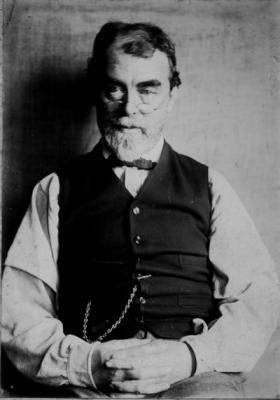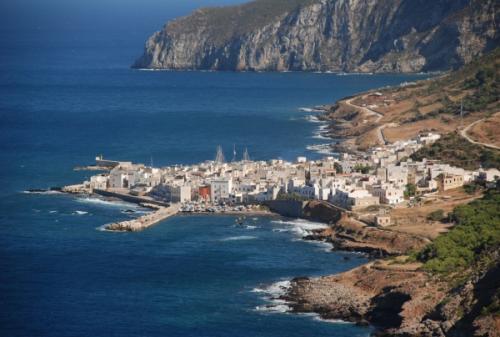Samuel Butler - Homeric writer, intrepid traveller

PALERMO-Samuel Butler was a Victorian iconoclast who fought radical battles against Established Church doctrines, Charles Darwin’s view of evolution and what he considered muddled thoughts about Shakespeare sonnets - among other issues.
He is remembered now for his utopian Erewhon novels and his semi-autobiographcal Way of all Flesh. Less well known is the enormous influence he had on English and Irish literature in the first part of the 20th century after his death. Even less well known is that he came firmly to believe that Homer’s Odyssey was written by a young unmarried woman from the small port of Trapani in western Sicily and that the saga described a real voyage around the coastline of that island. From 1892 till his death he persued this idea with energy, wrote a book about it (The Authouress of the Odyssey) and visited and revisited the island until his death im 1902.
The astonishing intellectual and physical energy he expended in the persuit of this particular conviction is a long story, but a small incident that occurred in 1894 illustrates rather well his, and indeed the 19th century’s, fearless attitude to travel that had a purpose … be it the pursuit of butterflies, the source of the Nile, the spread of Christianity, or – in this case - the need to prove that Homer’s Odyssey was written by a slip of a girl from an unknown port in the south-west of Sicily.
He was 59 years old, an elderly man for that time, and 1894 was the third year he had visited Sicly in the summer hunting out evidence in confirmation of his thesis. He departed from Clifford’s Inn in London on 30/7/94 and, after his customary visits in the North of Italy (which were concerned wth the piedmontese mountain sanctuaries and had nothing to do with Homer), he began the train journey South via Rome and Naples. He arrived in Sicily in early August with the resolute intention of continuing the investigations that would in the end prove the Sicilian origin of the Odyssey to the world and, in particular, to the despised Intellectual Establishment of Victoria’s empire.
His first visit was to Arcireale in the east, or rather the islands off the coast there: some had it that the islands were the remains of the rocks that Polyphemus hurled at Ulysses as he sailed past, others that the islands were where Ulysses and his men had hunted for wild goats. He was not prepared to entertain the authenticity of either of these claims. His next stop was at Castrogiovanni (now Enna), where the sight of Prosperine gathering flowers had induced Pluto to carry her off to the underworld; he was actually in search of the remains of ancient cyclopic walls, but here again he was not to be satisfied.
Talk, however, of ancient walls on the island of Marettimo off the coast of Trapani decided his next move. He had already seen from a distance, but not visited, this small island, which his reseaches in the Map Room of the British Museum had convinced him was the Ithaca of the Odyssey. It had to be visited.
He left at 10 pm on the 14thof August on the bi-weekly post cutter with a captain and two boys for a journey that should have lasted three or four hours. It was “a mere fisherman’s boat, a tub that would make 6 or 7 knots an hour, perhaps 10 feet broad and 20 ft. long, with a slightly arched upper deck and beneath this a hold, abour 4ft. high, filled with the properties of the captain, his son and another lad [cheese and onions and rum, dirty clothes and barrels of pickled sardines, cockroaches and black beetles]. The second of these boys had what I had not infrequently noticed among the young sailors of this neighbourhood, a singularly beatiful set of teeth, all white as ivory, set and packed like peas in a pod”.
Unfortunately the breeze failed and they rocked about almost stationary for many hours: they just made it next morning after eleven hours to another island, Favignana, where he was able to have a sort of bath, eat some food and take a sleep. As he put it “I am now writing this with with the very utmost difficulty in keeping awake, as you may imagine. At noon I shall dine and then I will take two solid hours of sleep after which, I doubt not, I shall be able to do my quantum of Homer [he was translating the Odyssey ‘for those who cannot read the original’] which I brought with me in case something should confine me”.
The following morning at 4:30 am they embarked again and made some headway with the help of a little rowing, stopping occasionally to steal and then cook red mullet from the wicker fish-traps left in the sea by fishermen, but it was not until about 9:30 pm when a feeble breeze at last made itself felt and they managed to reach their destination the next morning at 9:30 am – a trip of 48 hours to cover barely 30 miles or so.
“I presented my letter to the brigadiere who at once beat up the landlord and did his best for me. Ulysses himself was not a greater object of curiosity to the Phaecians than I found myself to these people”. He visited the ancient remains of civilisation on the island, but judged them to be older than the Odyssey. On the 17thhe lunched with the lonely Carabinieri brigadier (an NCO, not a high raking officer) and his two military underlings at their barracks. They had prepared the meal by themselves, as they had no servants. It consisted of chicken broth, the remains of the chicken that had given birth to the broth, far too much pasta (Butler halved his allotted portion before the meal began, but it was still too much) and then another chicken – a relation to the first one. Then came a dish of ‘land fish’, which the carabinieri supposed didn’t exist in England, but which had a delicious taste that remained with you for days.
‘You find them on walls and stones’, they explained.
‘Are they lizards, by any chance’? He asked.
‘No, lizards are not good to eat. Would you like to see the shells; we still have them in the kitchen’?
And they brought him a collection of about twenty or thirty snail shells. “I could have eaten a worser meat. Had it been lizards I could have eaten then and thanked god it was no worse. Had it been stewed mice – yet could I bear that too, well, very well. But snails! I would as soon eat cockroaches and blackbeetles. I thought of my uncle John and how his brothers, when he was a boy, offerered him sixpence if he would eat a cockroach. He mused for a while: ‘the stomach’, he murmured, ‘ will be the worst part’”. The meal was rounded off with two pears and two figs a head.
An extensive photographic session with the cooks followed (he always sent the end reults on to the their subjects after he had developed and printed then in London). He left the next day and got back to Trapani on Sunday 19that 4:00 am after another endless journey of 13 hours to find his correspondence, as always addressed to the local Poste Restante. One of his correspondents was able to inform him that Lord Salisbury in his presidential address to the British Association had apparently sided with his recent book Luck or Cunning’s views in opposition to Darwin’s mindless, mechanical theory of natural selection. Outwardly he did not seem impressed, but inwardly he always welcomed recognition that he was right and the intellectual Establishment had had got things sadly wrong..
The Authouress of the Odysseywas published in 1897. It had been most rigorously researched, but this time neither Lord Salisbury nor the intellectual Establishment were impressed. To this day it is a book that is not often read, but there are still enthusiastic supporters of Butler’s theory active in Sicily.
As a sign of the times and changes in the attitudes towards travelling, you can now reach the small island of Marettimo comfortably from Trapani by hydrofoil in almost no time at all – certainly in less than it would take to do a quantum of Homer, if you were so inclined.



